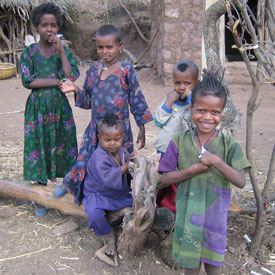Research discoveries protect babies from HIV
January / February 2013 | Volume 12, Issue 1
The last thing a mother wants to give her new baby is the HIV virus, but it was a frequent occurrence in the developing world until scientists discovered how to intervene. Babies are vulnerable to contagion throughout pregnancy, labor, delivery and breastfeeding, but today there are proven strategies to protect them.
HIV/AIDS research has been a major area of interest at the Eunice Kennedy Shriver National Institute of Child Health and Human Development (NICHD) since the epidemic began in the 1980s. This sustained effort has contributed to many significant successes. For example, a seminal NICHD clinical trial in which HIV-positive mothers received an antiretroviral drug in pregnancy showed a two-thirds reduction in HIV infection passed on to the babies.

Photo by Virginia Lamprecht/Photoshare
The National Institute of Child Health and
Human Development has contributed to almost
all major advances in children's health over the
last 50 years.
Since then, NICHD has conducted and supported numerous successful studies to identify and optimize strategies that block mother-to-child transmission, overseen by its Maternal and Pediatric Infectious Disease Branch. These include performing Cesarean deliveries and treating infected mothers or infants with antiretroviral drugs during breastfeeding, since the virus survives in breast milk. New drugs and regimens have helped bring the transmission rate down further, for instance to 1 or 2 percent in the U.S. and under 10 percent in Asia and Africa.
As HIV research has become increasingly global in nature, research questions have emerged regarding HIV-associated coinfections, such as TB, hepatitis and malaria. The NICHD has responded by promoting and funding new research on these infectious pathogens, as well as investigations of vaccines to prevent HIV and other high-priority infectious diseases in children, adolescents and pregnant women.
More Information
To view Adobe PDF files,
download current, free accessible plug-ins from Adobe's website.